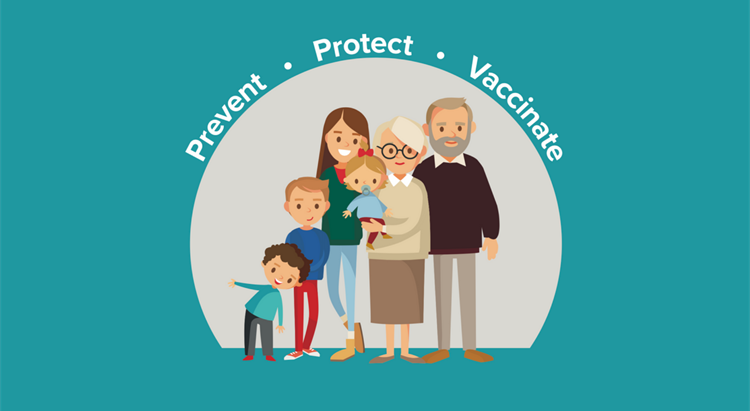25 April 2019

As part of World / European Immunisation Week (24th – 30th April 2019), doctors are encouraging families and individuals planning to travel to the UK, Europe or further afield whether in summer or at any other time of the year to ensure they and their children are up to date with the recommended vaccinations before leaving Jersey.
The warning follows an alarming surge in measles cases in the European region and beyond. In 2018, 82 596 people in 47 of 53 European countries contracted measles (WHO data*). In 2018, measles killed 72 children and adults in the European Region. In countries reporting hospitalisation data, nearly 2/3 (61%) of measles cases were hospitalised.
The total number of people infected with the virus in 2018 was the highest this decade: three times that reported in 2017 and 15 times higher than in 2016. The top five countries experiencing measles outbreaks in Europe are the Ukraine (over 53,000 cases in 2018), Serbia, Israel, France and Italy. Romania is amongst the top ten most affected countries. Further afield, New York declared a state of emergency earlier this month following a severe re-emergence of this preventable viral infection. Travellers mix with the local population and with each other in airports and other centres. Measles infection spreads quickly and easily.
At least 95% of the population needs to be immune either through prior natural infection or nowadays two doses of measles, mumps and rubella (MMR) vaccination, to ensure that a community as a whole is protected from an outbreak: this is known as ‘herd immunity’.
High level of protection
Dr Susan Turnbull, Medical Officer of Health, said, "We are very proud in Jersey that we have achieved such a high level of protection of our population with the MMR vaccine especially in the younger population. However, anyone, child or adult, who has not had MMR vaccine for whatever reason, or hasn’t had measles as a child, remains highly susceptible to measles infection. Unprotected people are much less likely to encounter someone with measles infection here in Jersey because of this community’s ‘herd immunity’.
"However, even in Jersey it would only take exposure to one measles-infected individual – perhaps a traveller infected elsewhere who has returned to Jersey - to start incubating this miserable and sometimes very serious illness. If infected whilst away – much more likely because there is so much measles infection almost everywhere else – the measles-infected, infectious ‘case’ and their family / travelling group would then be subject to the public health measures required in the country of diagnosis to prevent further spread.
"With our nearest neighbours, France and UK, continuing to be ‘measles hotspots’, to avoid potentially major holiday complications I would urge anyone planning travel away from Jersey with unvaccinated family / group members to bear this in mind, and think about MMR vaccination status as part of holiday preparation. This is just as important for school trips as well as family and other holidays."
Dr Ivan Muscat, Consultant in Communicable Disease Control said, "Many individuals living and working in Jersey are from countries where the MMR uptake is lower and they remain susceptible to measles. Such individuals, be they adult or child, should be vaccinated with MMR if they are unsure of their vaccination status. This is important whether they are travelling abroad or not, but is of course particularly important if travelling abroad – not just to their country of origin which may well have a higher incidence of measles, but any country including the UK."
Myths and misinformation
Dr Linda Diggle, Head of Preventive Programmes, stated, "Our 2018 provisional vaccination statistics show 96.5% of children in Jersey received the first MMR vaccine dose by the age of two – above the World Health Organization’s target of 95%. Also, 93.1% of Jersey children received the second MMR dose by the age of five."
"There are very few unprotected children in Jersey. However, we are not complacent and everyone needs to realise that this disease, which is one of the most infectious viruses we know, is circulating in Europe and elsewhere. The World Health Organization had, only a few decades ago, anticipated that measles would soon be eradicated. But myths and misinformation about the vaccine started by one individual and spread via media has undermined this goal."
Dr Diggle added, "Everyone who uses social media has a responsibility to be careful about sharing incorrect information. It’s all too easy for myths and misinformation to create doubt amongst parents such that they don’t protect their child. This can mean that, without realising, parents take a greater risk with the disease than they were ever taking by getting their child vaccinated. We’ve seen in Jersey how easy it is for misinformation to spread across social media.
"In October last year, when we were offering a nasal flu vaccine to protect children and help prevent the spread of winter flu around our island, inaccuracies about the nasal vaccine began circulating. Thankfully, most parents recognised the social media stories as scaremongering and uptake of the nasal flu vaccine amongst primary school children was higher last winter than the year before (61% in 2018 compared to 59% in 2017) with 51% of secondary school children getting protected against flu for the first time."
Dr Muscat added "The nasal vaccination given to children in 2018 was 87% effective against flu. Not only did we protect thousands of children and help prevent the spread of flu across our community, but we helped prevent the hospital experiencing winter flu pressures, such that no wards had to be closed in the winter and no planned operations had to be cancelled because of flu."
Immunisation is vital to prevent diseases and protect lives. If you’re unsure about your MMR vaccination status, check with your GP or contact the child health administrator and, if unvaccinated or you remain unsure, get vaccinated especially if you are travelling, to protect yourselves, your children and the community as a whole.